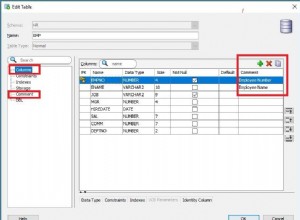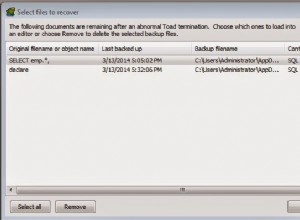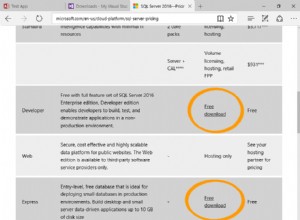- Si des erreurs se produisent avec cx_Oracle, il est probablement préférable de les consigner dans un fichier texte.
- Vous pouvez essayer de rediriger sys.stdout et sys.stderr vers des objets de type fichier qui enregistrent tout ce qui leur est écrit dans un journal.
- Je suppose que vous voulez vous engager après chaque événement, à moins que vous n'ayez de bonnes raisons de ne pas le faire. Alternativement, vous pouvez mettre en mémoire tampon plusieurs événements et les écrire tous dans une seule transaction de temps en temps.
- Vous trouverez ci-dessous un exemple qui utilise mx.ODBC, vous pouvez probablement l'adapter à cx_Oracle sans trop de problèmes. Il est censé être compatible Python DB-API 2.0, je pense.
La distribution de journalisation Python autonome (avant que la journalisation ne soit ajoutée à Python) se trouve à l'adresse https://www.red-dove.com/python_logging.html et bien que le package de journalisation en Python soit beaucoup plus à jour, la distribution autonome contient un test répertoire qui contient de nombreux exemples utiles de classes de gestionnaires dérivés.
#!/usr/bin/env python
#
# Copyright 2001-2009 by Vinay Sajip. All Rights Reserved.
#
# Permission to use, copy, modify, and distribute this software and its
# documentation for any purpose and without fee is hereby granted,
# provided that the above copyright notice appear in all copies and that
# both that copyright notice and this permission notice appear in
# supporting documentation, and that the name of Vinay Sajip
# not be used in advertising or publicity pertaining to distribution
# of the software without specific, written prior permission.
# VINAY SAJIP DISCLAIMS ALL WARRANTIES WITH REGARD TO THIS SOFTWARE, INCLUDING
# ALL IMPLIED WARRANTIES OF MERCHANTABILITY AND FITNESS. IN NO EVENT SHALL
# VINAY SAJIP BE LIABLE FOR ANY SPECIAL, INDIRECT OR CONSEQUENTIAL DAMAGES OR
# ANY DAMAGES WHATSOEVER RESULTING FROM LOSS OF USE, DATA OR PROFITS, WHETHER
# IN AN ACTION OF CONTRACT, NEGLIGENCE OR OTHER TORTIOUS ACTION, ARISING OUT
# OF OR IN CONNECTION WITH THE USE OR PERFORMANCE OF THIS SOFTWARE.
#
# This file is part of the standalone Python logging distribution. See
# https://www.red-dove.com/python_logging.html
#
"""
A test harness for the logging module. An example handler - DBHandler -
which writes to an Python DB API 2.0 data source. You'll need to set this
source up before you run the test.
Copyright (C) 2001-2009 Vinay Sajip. All Rights Reserved.
"""
import sys, string, time, logging
class DBHandler(logging.Handler):
def __init__(self, dsn, uid='', pwd=''):
logging.Handler.__init__(self)
import mx.ODBC.Windows
self.dsn = dsn
self.uid = uid
self.pwd = pwd
self.conn = mx.ODBC.Windows.connect(self.dsn, self.uid, self.pwd)
self.SQL = """INSERT INTO Events (
Created,
RelativeCreated,
Name,
LogLevel,
LevelText,
Message,
Filename,
Pathname,
Lineno,
Milliseconds,
Exception,
Thread
)
VALUES (
%(dbtime)s,
%(relativeCreated)d,
'%(name)s',
%(levelno)d,
'%(levelname)s',
'%(message)s',
'%(filename)s',
'%(pathname)s',
%(lineno)d,
%(msecs)d,
'%(exc_text)s',
'%(thread)s'
);
"""
self.cursor = self.conn.cursor()
def formatDBTime(self, record):
record.dbtime = time.strftime("#%m/%d/%Y#", time.localtime(record.created))
def emit(self, record):
try:
#use default formatting
self.format(record)
#now set the database time up
self.formatDBTime(record)
if record.exc_info:
record.exc_text = logging._defaultFormatter.formatException(record.exc_info)
else:
record.exc_text = ""
sql = self.SQL % record.__dict__
self.cursor.execute(sql)
self.conn.commit()
except:
import traceback
ei = sys.exc_info()
traceback.print_exception(ei[0], ei[1], ei[2], None, sys.stderr)
del ei
def close(self):
self.cursor.close()
self.conn.close()
logging.Handler.close(self)
dh = DBHandler('Logging')
logger = logging.getLogger("")
logger.setLevel(logging.DEBUG)
logger.addHandler(dh)
logger.info("Jackdaws love my big %s of %s", "sphinx", "quartz")
logger.debug("Pack my %s with five dozen %s", "box", "liquor jugs")
try:
import math
math.exp(1000)
except:
logger.exception("Problem with %s", "math.exp")




